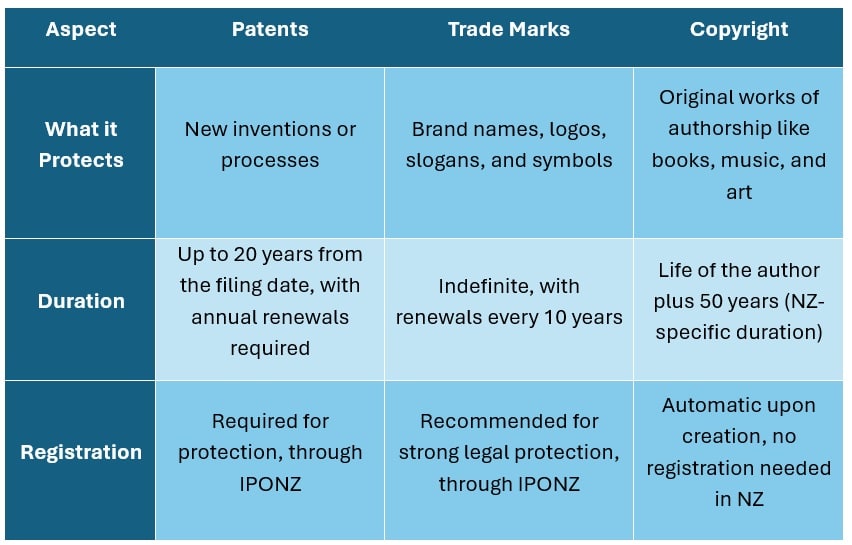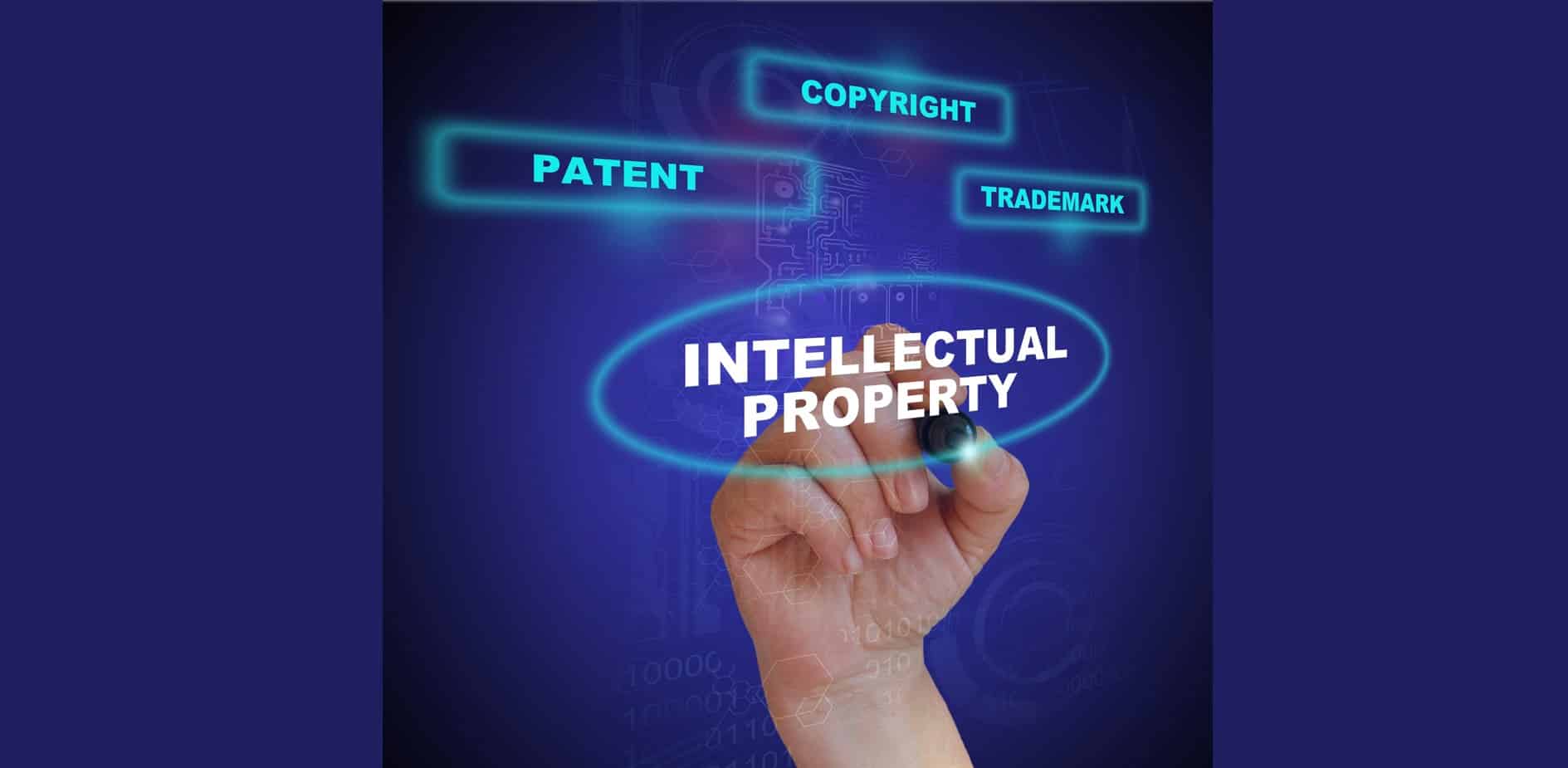In the fast-paced world of business, confusion around intellectual property (IP) rights is more common than you might think. Take this real-world scenario: a tech startup in Auckland spends months perfecting a groundbreaking app. They’re ready to launch, only to discover that a competitor has filed for a similar patent, leaving them vulnerable to costly legal battles. Meanwhile, a local café owner, proud of their brand’s unique name and logo, learns that another business has already trademarked it, risking a complete rebrand. And let’s not forget the freelance designer who, without realising it, loses control over their artwork’s copyright because they didn’t understand their rights.
These situations aren’t hypothetical nightmares—they’re real challenges faced by Kiwi businesses every day. Understanding IP rights is vital, but the differences between patents, trade marks, and copyrights can feel like a maze of legal jargon.
This article cuts through the confusion, offering a clear and simple guide to these forms of IP protection. You’ll learn what each one covers, how they differ, and why getting them right matters for the future of your business. And if you’re serious about safeguarding your innovations and brand, consulting with an IP lawyer is the smartest move you can make.
What is a Patent?
- Definition: A patent grants exclusive rights to an inventor for a new product or process, allowing them to prevent others from making, using, or selling the invention without permission.
- Types of Patents: In New Zealand, the primary type is the standard patent, which covers inventions that are new, involve an inventive step, and are useful.
- Examples: Innovations like a new pharmaceutical compound, a unique manufacturing process, or a novel mechanical device can be patented.
- Duration and Requirements: A standard patent in New Zealand lasts for up to 20 years from the filing date, provided annual renewal fees are paid. To be patentable, an invention must be novel, involve an inventive step, and be capable of industrial application.
- Common Misconceptions: It’s a misconception that patents are easy to obtain; the process is rigorous and requires detailed documentation. Additionally, patents do not last indefinitely; they have a finite term.
What is a Trade Mark?
- Definition: A trade mark is a sign used to distinguish the goods or services of one trader from those of others.
- Purpose: Trade marks protect brand identity, helping consumers identify the source of goods or services and preventing confusion in the marketplace.
- Examples: Brand names, logos, and slogans, such as the Nike “swoosh” or the phrase “Just Do It,” are trade marks.
- Trade mark Registration: While registration is not essential, it provides statutorily defined rights, offering stronger legal protection and the exclusive right to use the trade mark in New Zealand.
- Duration and Renewal: Registered trade marks can be renewed indefinitely every 10 years, provided renewal fees are paid, allowing for perpetual protection as long as the trade mark remains in use.
What is Copyright?
- Definition: Copyright protects original works of authorship, including literary, dramatic, musical, and artistic works, giving the creator exclusive rights to use and distribute their work.
- What it Covers: Copyright provides rights such as reproduction, distribution, public performance, and adaptation of the work.
- Examples: A published novel, a song, a movie script, or a piece of software code are all protected by copyright.
- Automatic Protection: In New Zealand, copyright protection is automatic upon the creation of the work; registration is not required.
- Duration: The duration of copyright varies: for literary, dramatic, musical, and artistic works, it generally lasts for 50 years from the end of the calendar year in which the author dies.
Key Differences at a Glance
To make the distinctions crystal clear, here’s a quick breakdown:

Use Cases
- Patent: A tech company in Auckland creates an innovative smartphone feature that boosts battery life and wants to ensure no competitor can copy the technology.
- Trade Mark: A new Wellington-based café called “Bean Bliss” wants to protect its unique name and logo to prevent other businesses from using similar branding.
- Copyright: An author in Christchurch writes and publishes a series of children’s books and wants to ensure that no one reproduces or distributes their work without permission.
Why Protecting IP is Vital for Your Business
Preventing Legal Disputes
IP protection acts as a legal shield, reducing the risk of costly legal battles. For example, having a registered trade mark means your business can more easily defend itself against brand identity theft or misrepresentation. In a country where innovation is highly valued, such as New Zealand, this protection is indispensable.
Securing Business Value
Registered IP rights can significantly increase a company’s valuation. Patents, for instance, are considered valuable assets that can attract investors and open up revenue opportunities through licensing or sale. For a tech startup in New Zealand, having a patent on a groundbreaking invention could be a game-changer, making the company more attractive to venture capitalists.
Brand Reputation
Trade marks are vital for protecting your brand identity and maintaining consumer trust. In a market as competitive as New Zealand’s, ensuring that your brand stands out and is not easily replicated safeguards your reputation. Consumers are more likely to trust and remain loyal to brands that are well-protected and clearly identifiable.
When to Consult an IP Lawyer
Complexity of IP Law
Navigating the world of intellectual property law isn’t a simple task. From filing the correct paperwork to understanding the nuances of what can and cannot be protected, the process is riddled with complexities. Missteps in this area can be costly and damaging to your business. That’s why consulting a professional IP lawyer is a strategic move. They have the expertise to ensure your IP assets are properly protected, and your rights are enforced.
Tailored Advice
Every business is unique, and a one-size-fits-all approach simply doesn’t work when it comes to IP protection. An IP lawyer can provide customised guidance tailored to your specific needs, whether you’re a tech startup in Wellington or a retail brand in Auckland. They’ll help identify the best type of protection for your assets and develop a strategy that aligns with your business goals.
Getting Started
Don’t wait until an issue arises. Proactively safeguarding your IP can save you headaches and financial loss down the road. Taking that first step is as simple as scheduling a consultation with an IP expert. Protect your innovations, secure your brand, and set your business up for long-term success.
FAQs
What is IP, and why is it important for my business?
IP refers to the legal rights protecting creations like inventions, brand names, and artistic works. Securing IP protection is crucial as it safeguards your business’s competitive edge, increases valuation, and helps prevent legal disputes or misuse of your assets.
What’s the difference between a patent, a trade mark, and copyright?
- Patent: Protects new inventions or processes, giving exclusive rights for up to 20 years.
- Trade mark: Safeguards brand elements like logos, names, or slogans to maintain brand identity and prevent consumer confusion.
- Copyright: Protects original works, like books and software, granting the creator rights to reproduce and distribute the work.
How do I know if my idea is patentable?
An idea must be novel, inventive, and industrially applicable to be patentable. Consulting an IP lawyer or conducting a patent search can help determine eligibility and ensure similar patents don’t already exist.
Why should I register a trade mark instead of relying on common law rights?
While common law rights offer some protection, registering a trade mark provides stronger legal safeguards, nationwide recognition, and the exclusive right to use the mark for your goods or services. This legal backing makes enforcement easier and more effective.
How long does copyright last in New Zealand?
Copyright protection typically lasts for the life of the author plus 50 years. For corporate works, it lasts 50 years from publication. Copyright is automatic upon creation, but registration offers additional legal advantages.
When should I consult an IP lawyer?
Early consultation is key, especially when launching new products, developing a brand, or planning international expansion. An IP lawyer provides tailored advice to prevent costly mistakes and ensure robust protection for your assets.
Can IP protection extend internationally?
Yes, but IP rights are territorial. Protection in New Zealand does not automatically cover other countries. An IP lawyer can assist with international filings to secure rights where you plan to do business.
What should I do if someone infringes on my IP rights?
Act swiftly and consult an IP lawyer. They can assess the situation, issue cease-and-desist letters, or pursue legal action if necessary. Prompt action is critical to prevent further damage or loss.
Final Remarks
Understanding the differences between patents, trade marks, and copyrights is fundamental to protecting your creative and business assets. Patents cover new inventions, trade marks safeguard brand identity, and copyrights protect original works. Each has its own purpose and set of rules, and knowing these can make all the difference for your business.
In today’s competitive landscape, being proactive about IP protection is not just wise; it’s necessary. Ensuring your intellectual property is secured can prevent legal issues, strengthen your market position, and boost your company’s value.
